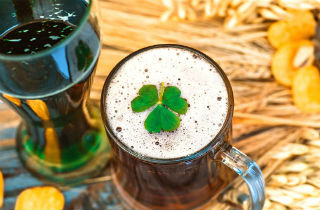IRA = Irish, Roman Catholic Alcoholics
As you may have guessed with a name like Brian McAlister I am of Irish Decent. My mother is an O’Brien and my father a McAlister. I am from a long line of Irish, Roman Catholic, Alcoholics or IRA as they are affectionately known in some circles.
My first sponsor, also an Irishman from the South Bronx NYC explained to me,
“We come by it honestly; birds fly, fish swim, we drank.”
Drinking as social tool
Growing up I never heard the word “alcoholic” used. More simply, dinking was a rite of passage. Alcohol was at the core of our social gatherings. It was considered bad manners to not offer a guest a drink upon entering your home.
Traditions of St. Patrick’s Day
Why do the Irish drink excessively?
We never needed a special event or party as an excuse to overindulge, but on Saint Patrick’s Day we took the insanity to a new level. After all wasn’t St. Patrick the patron Saint of Ireland? Don’t I owe an allegiance to his good name and good works by celebrating his Sainthood? Why, it would be blasphemous to not pay such a man homage, march in his parade and raise a toast to his good name.
Looking back from a sober point of reference the whole thing makes no sense at all. None the less, from the age of 13 until I got sober at 33, I considered it my religious and moral responsibility to get morbidly drunk on Saint Patrick’s Day.
I was not alone.
Many people feel the same way. The New York City Saint Patrick’s Day parade is the largest parade in the United States. Public intoxication, urination, and let’s not forget the ever popular vomiting in the streets and subways is simply accepted and expected.
Q: How did this come to be?
A: Drinking and drunkenness can be a learned behavior.
I can only speak for myself when I say that my attitude toward drinking, drugging, Saint Patrick’s Day and most other things in life were learned behavior. These and many other habits were passed down through the generations to me by people who really loved me.
The world is full of people trying to get our attention. It starts with our parents but includes, friends, teachers, advertisers, television, the list goes on ad infinitum. By placing trust in certain people, groups or things we develop beliefs that overtime we accept as truths even if they are or not. A lie isn’t a lie if we believe it.
Beliefs as hand-me-downs
Many of the ideas I had regarding right and wrong, success, God, and what I was capable of accomplishing in life were hand me downs from other people. Like most of us, I was subjected to rules, fears, beliefs and dogma that I absorbed along the way without questioning it. Some of these ideas were good and some not so good, but by repetition and finally acceptance they became part of my personality traits.
Celebrating Saint Patrick’s Day, for example, or any other day for that matter, has absolutely nothing to do with overindulging in alcohol or any other substance. Yet, I believed for years that drunkenness and celebration were one in the same. I called it partying but believe me it was no party. It was self-destruction on a grand scale.
Sobriety means you change … EVERYTHING!
When I entered recovery a man told me I needed to change just one thing; EVRYTHING! Trying to remain rigid or static would only end in disappointment and frustration. I needed to be willing to open my mind to a new level of possibility.
By following suggestions from different people, namely my sponsor and other healthy recovering addicts, I was able to develop some new more empowering beliefs. It didn’t happen overnight but it did happen. Paradoxically by admitting I was powerless over alcohol and drugs I gained a new found power; the power of choice. The power to choose intelligently what I would believe and what rules I would allow to influence my life.
True peace comes from purpose
Abstinence is merely the beginning of life in recovery. Working the steps, raising our consciousness and developing a working spirituality gives us the courage to change and experience our full potential. As our consciousness changes the world around us will change.
Remember the Creator has individualized himself in you. Don’t look back. Believe in yourself and expect a bright future. Trust in a Power Greater than yourself to relieve you of self-imposed limitation. Take daily action and live a full and abundant life in recovery. We all have a purpose. Stay clean and sober. Find your purpose, do your best to carry it out, and you will know peace.








